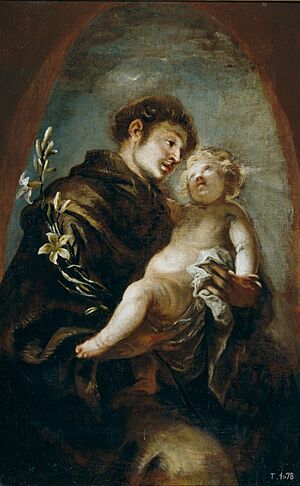Francisco Herrera the Younger facts for kids
Quick facts for kids
Francisco Herrera the Younger
|
|
|---|---|
| Born |
Francisco Herrera
1622 |
| Died | 25 August 1685 (aged 62–63) |
| Nationality | Spanish |
| Occupation | Painter, architect |
| Parent(s) |
|
Francisco Herrera the Younger (also known as "el Mozo") was a Spanish painter and architect. He was born in 1622 and passed away on August 25, 1685.
Contents
About Francisco Herrera the Younger
Early Life and Training
Francisco Herrera the Younger was born in Seville, Spain. He was the second son of another famous painter, Francisco Herrera the Elder. Francisco the Younger started learning to paint from his father.
However, his father's teaching style was very strict. Because of this, young Francisco decided to leave Seville and travel to Rome. He spent six years in Rome studying architecture, how to show depth in paintings (called perspective), and ancient art. He especially wanted to learn how to create fresco paintings, which are murals painted directly onto wet plaster.
A Master of Still Life
While in Rome, Francisco Herrera the Younger became very skilled at painting still life pictures. These are paintings of everyday objects. He was especially good at painting bodegones, which are still life paintings often featuring food.
His paintings of fish were so realistic and well-done that people in Rome gave him a special nickname: lo Spagnuolo dei pesci. This means "the Spaniard of the Fish."
Moving to Madrid
In 1656, Francisco Herrera the Younger returned to Seville. He helped start the Seville Academy, which was an art school. In 1660, he became its sub-director, working under the famous painter Bartolomé Esteban Murillo.
Francisco was known for being proud and sometimes difficult. He didn't like being second-in-command at the academy. So, around 1661, he decided to move to Madrid. Before leaving Seville, he painted two large pictures for the city's cathedral. He also painted a "St. Francis" for a chapel, which some people consider his best work.
Royal Painter and Architect
In Madrid, Francisco Herrera the Younger painted a large artwork called Triumph of St. Hermengild for a church. He also created several fresco paintings in another church, San Felipe el Real. These works were admired by Philip IV of Spain.
King Philip IV then asked him to paint the dome of the chapel of Our Lady of Atocha. After this, the king made him a royal painter and the superintendent of royal buildings. Besides his still life work, Herrera also painted many portraits. While his portraits might not have been as strong as his father's, they showed a better understanding of chiaroscuro. This is an art technique that uses strong contrasts between light and dark.
Later, Charles II of Spain kept Herrera at his royal court. King Charles II made him the master of royal works. For this king, Herrera helped renovate the Basilica of Our Lady of the Pillar in Zaragoza. Francisco Herrera the Younger passed away in Madrid in 1685.
See Also
In Spanish: Francisco de Herrera el Mozo para niños
 | William Lucy |
 | Charles Hayes |
 | Cleveland Robinson |


